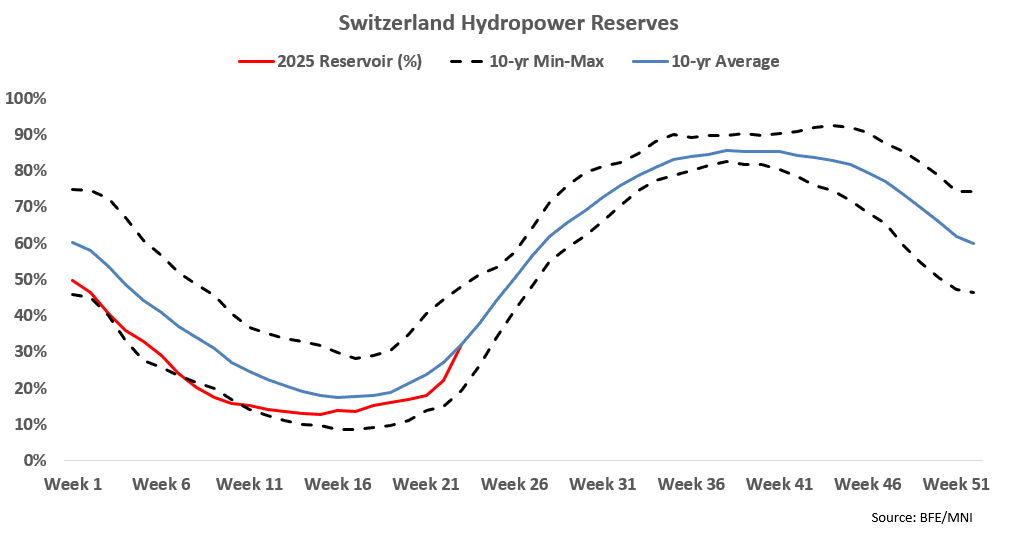POWER: Swiss Hydro Stocks Rise Near 10-Year Average
Swiss hydropower reserves last week – calendar week 23 – saw the fastest weekly increase by 9.8 percentage points to 32% of capacity to be broadly in line with the 10-year average, BFE data showed.
- Reserves increased by 4.3 points the week prior.
- Stocks switched to a surplus to last year’s level of 2.7 points, compared to a deficit of 2.7 points the week prior.
- The deficit to the 10-year average also narrowed sharply to 0.1 points, from 4.8 points the week before.
- Power demand in Switzerland last week averaged 6.41GW, down from 6.57GW the week before, amid public holiday on 2 June.
- Snow height at the L'Ecreuleuse measuring point stood at 8cm as of 12 June. Levels were at around 120cm as of late May – suggesting increasing snow melt in the past weeks, White Risk data showed.
- Planned works at Alpiq’s 1.02GW Kernkraftwerk Gosgen nuclear power plant has been extended until 4 July.
- Precipitation in Sion, in the hydro-intensive canton of Valais, stood at 15.2mm last week – well below the seasonal normal of 67.6mm.
- The latest Bloomberg ECMWF weather forecast for Sion suggests precipitation at 20.8mm this week – also well below the seasonal average of 60.7mm.
- The latest Swiss hydro balance is forecast to end this week at -3.25TWh. The balance is further forecast to edge down to -3.78TWh as of 27 June, Bloomberg data showed.

Want to read more?
Find more articles and bullets on these widgets:
Historical bullets
LOOK AHEAD: Tuesday Data Calendar: April CPI, Treasury Bills
- US Data/Speaker Calendar (prior, estimate)
- 13-May 0600 NFIB Small Business Optimism: reported 95.8 vs. 95.0 est
- 13-May 0830 CPI MoM (-0.1%, 0.3%), YoY (2.4%, 2.4%)
- 13-May 0830 CPI Ex Food and Energy MoM (0.1%, 0.3%), YoY (2.8%, 2.8%)
- 13-May 0830 CPI Index NSA (319.799, 320.906)
- 13-May 0830 CPI Core Index SA (325.659, 326.629)
- 13-May 0830 Real Avg Hourly Earning YoY (1.4%, --), Weekly (1.1% revised, --)
- 13-May 1130 US Tsy $48B 52W & $70B 6W bill auctions
US: WaPo-White House Looks To Strike Chips & Minerals Deal On Middle East Trip
The Washington Post reports that the Trump White House is set to authorise the sale of advanced AI chips to Middle Eastern firms connected to the Saudi and Emirati gov'ts as part of an effort to bolster AI development in the region as a bulwark against China. The report claims that the deals could be finalised during President Donald Trump's ongoing visit to the region. Speculation of the deal first appeared in NYT.
- The article also claims that the US has "also approved a memorandum of understanding worth $9 billion between a U.S. company and Saudi partners to mine and process critical minerals used in advanced manufacturing, energy and defense,". The docs seen by WaPo claim that a Saudi firm "will prospect for lithium, cobalt and rare earth elements in Saudi Arabia and elsewhere, such as Africa, which can be exported to the United States."
- The provision of high-tech chips to foreign nations marks a stark change from the Biden administration, which severely curtailed the provision of chips and equipment used to manufacture advanced chips, in order to slow China's rapid development of high-tech and AI capabilities.
- Sam Winter-Levy, a fellow at the Carnegie Endowment for International Peace think tank says to WaPo “This is an administration that prides itself on using U.S. leverage to the max and driving a hard bargain, but this deal seems to be shaping up to be a giveaway of a core strategic technology in exchange for pretty short-term and superficial concession,”
US DATA: Small Businesses More Focused On Tax Cuts And Jobs Act Renewal
Interestingly, whilst the NFIB press release notes the sudden and dramatic changing in costs from tariffs, inflation is in third place on small businesses list of concerns. Excerpts from the press release (in full here):
- “Very few small businesses export their goods and services, but millions acquire imported goods as inputs to their operations and those supply chains are currently at risk. Tarriff policy is suddenly and dramatically changing relative prices (costs), and relative prices drive all decisions. Uncertainly remains elevated and thus caution clouds spending, hiring, and investing decisions.”
- “While the quality of the available labor force remains the top problem, taxes are close behind, and for over 51 years have received the most votes for single most important business problem. Renewal of the Tax Cuts and Jobs Act (TCJA) remains a major source of uncertainty. Nearly 1 in 10 owners view government regulations and red tape as their top business problem, a form of taxation in which the government directs the expenditure of resources for compliance.”
- “Inflation continues to fade in the list of concerns (now ranking third). Actual inflation is low, although not quite at the Fed’s goal of 2 percent. But prices are still rising, and what owners want to see is a reversal of the cumulative 20 percent increase in prices under the Biden administration. History tells us that this has always required a slowdown in the economy. Massive improvements in productivity, which reduce production costs (especially in services), can trigger lower selling prices. This is a far more attractive path to achieving their goal. However, this will require substantial investment. Capital spending has been anemic since 2020, and capital spending plans are at the lowest level seen since 2020.”